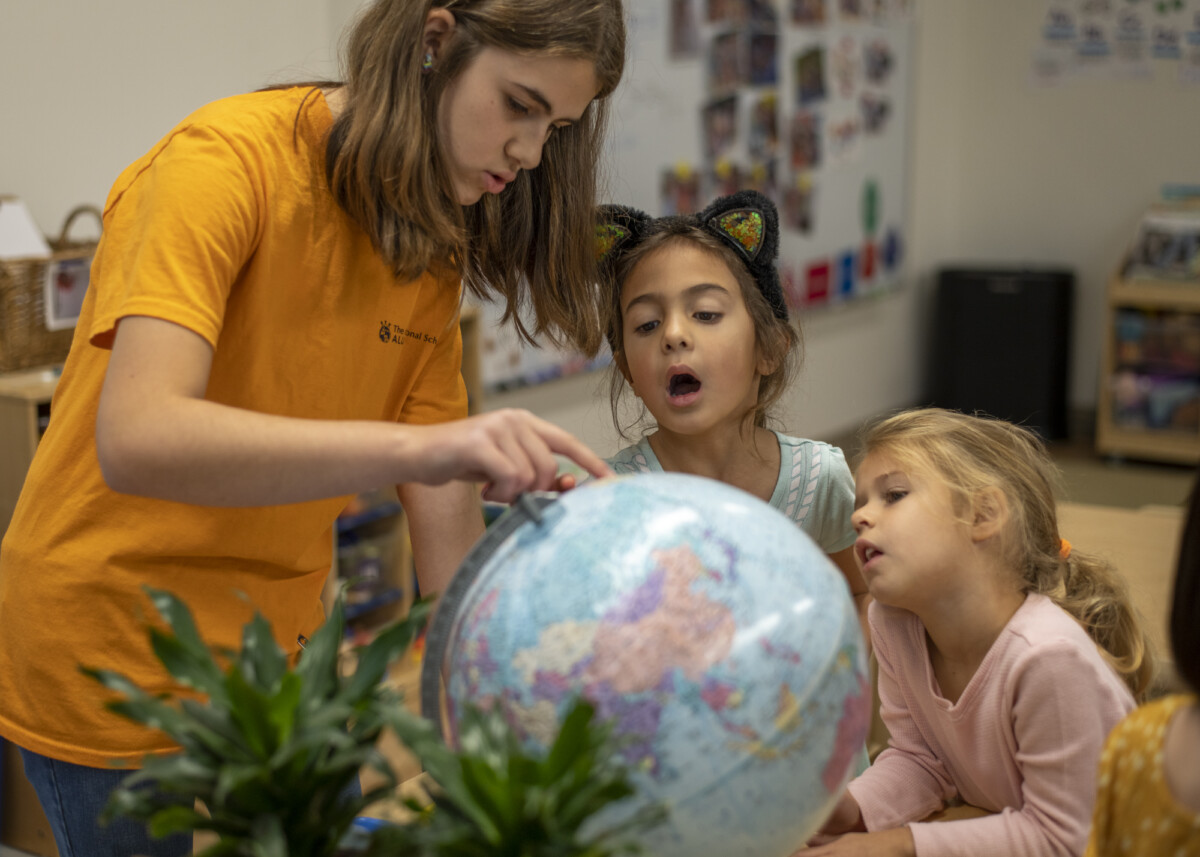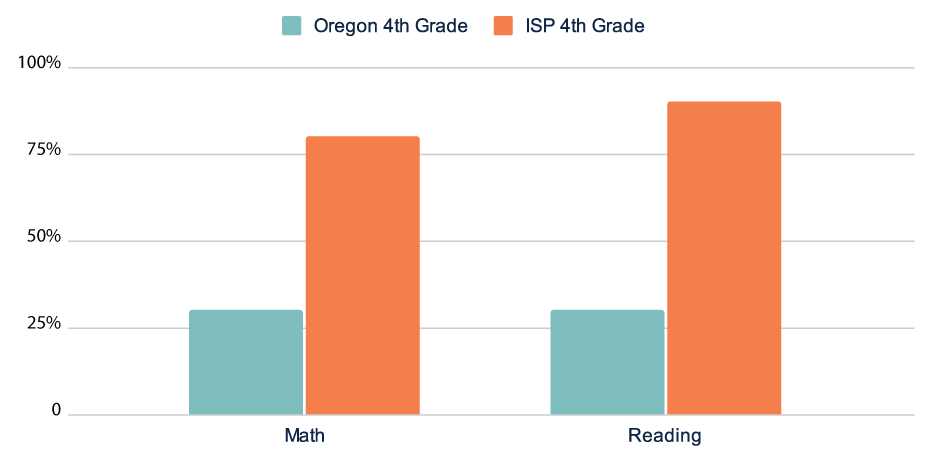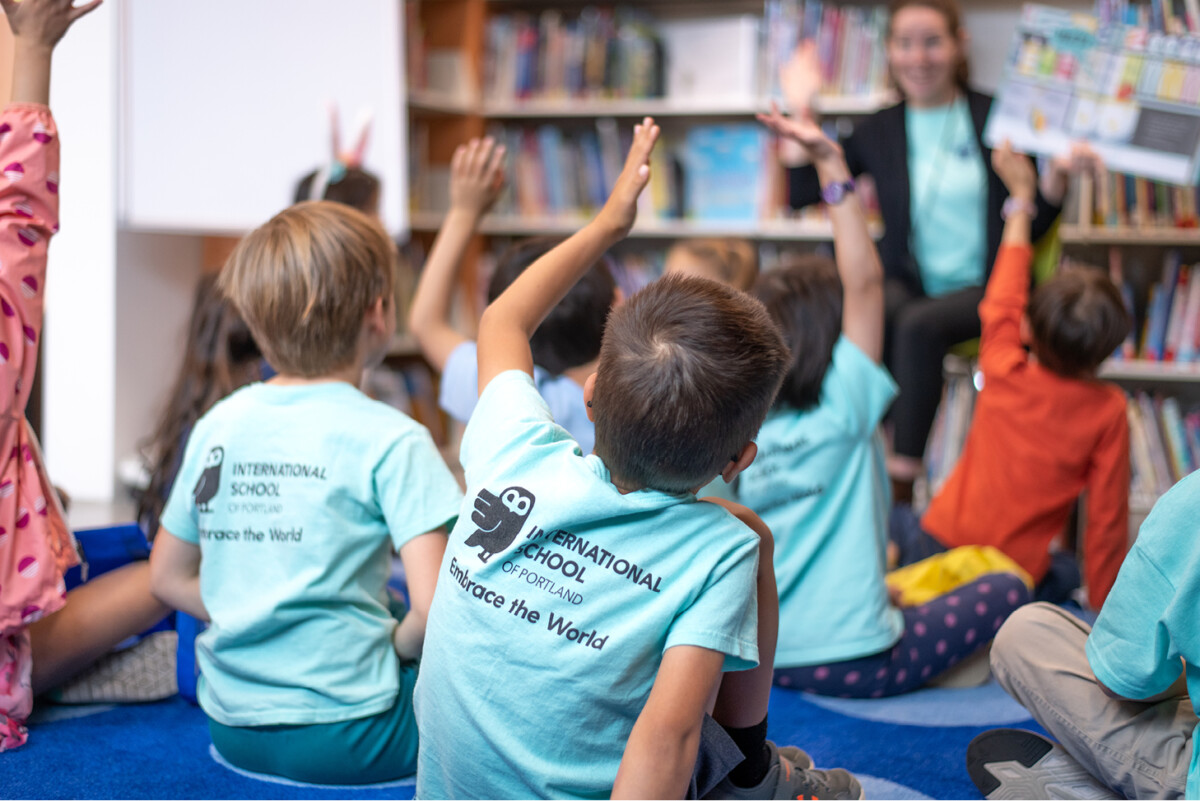How language immersion positively impacts young brains
Language immersion is a powerful educational approach that not only promotes fluency in a second language, but also fosters problem-solving skills, mental flexibility, creativity, and cultural understanding while strengthening focus and engagement.
Studies show that children who are immersed in a second language in school tend to have stronger cognitive skills and enhanced academic performance overall. They also gain valuable perspective through cultural enrichment, and a wider range of career opportunities in adulthood.
Here are the enormous, lifelong benefits of language immersion, according to research:
The Earlier the Better
Younger kids have an easier time learning and retaining new languages – and get the most benefit.
The earlier a child begins language immersion, the more likely they will quickly attain native-like language proficiency. Researchers at Cornell University have found that putting a child in situations where a second language surrounds them results in grammatical knowledge similar to their native English.

ISP focuses on having even our youngest students – as early as age 3 – immersed for 80% of their day in their target language. There is strong evidence for the learning advantages of this level of immersion at a young age:
- Up until age 8, young learners benefit from flexible ear and speech muscles that can detect differences between the sounds of a second language, according to a Michigan State University study on the advantages of a bilingual brain. While adults must consider grammar rules and practice, young children absorb sounds, structures, information patterns, and the rules of a second language very easily.
- Early exposure to multiple languages also builds social and emotional skills at a key age, according to additional research. Young children who are raised bilingual learn to follow social cues to figure out which language to use with which person, and in what setting. As a result, bilingual children as young as age 3 demonstrated a head start on tests of perspective-taking and theory of mind – both of which are fundamental social and emotional skills.
- Learning a second language does not cause language confusion, language delay, or cognitive deficit, which have been concerns in the past. In fact, according to studies at the Cornell Language Acquisition Lab (CLAL), children who learn a second language can maintain attention despite outside stimuli better than children who know only one language. In other words, cognitive advantages develop by becoming bilingual.
Improves Academic Performance
Students in language immersion programs tend to perform well academically, including in subjects such as math and science.
- A four-year, randomized trial at American University found that dual-language students outperformed their peers in English-reading skills by a full school year’s worth of learning by the end of middle school. Because the effects are found in reading, not in math or science where there were few differences, the findings suggest that learning two languages makes students more aware of how language works in general, also known as “metalinguistic awareness.”
- Wayne Thomas and Virginia Collier, professors emeritus at George Mason University in Virginia, have spent 30 years collecting evidence on the benefits of bilingual education. In studies covering six states and 37 districts, they have found that compared with students in English-only classrooms or in one-way immersion, dual-language students have somewhat higher test scores and also seem to be happier in school. Attendance is better, behavioral problems fewer, and parent involvement higher.
ISP 4th graders are outperforming their peers in math and reading proficiency
This is shown in a side-by-side comparison of learning assessments at ISP and Oregon public schools:

Promotes Cognitive Development
Bilingualism can have a positive impact on cognitive development, including improved problem-solving, time-management, and decision-making skills, which is a key reason why students in language immersion programs tend to perform better in school.

- Psycholinguist Mark Antoniou of Western Sydney University in Australia argues that bilingualism promotes brain health, especially as we age. One advantage involves skills that allow us to control and manage our attention, as well as our ability to plan. Bilingual people are constantly managing the languages they speak, so they don’t say the wrong word in the wrong language. The brain areas responsible for this skill are also used when performing tasks among distractions. The task may have nothing to do with language; it could be trying to listen to something in a noisy environment or sorting through photographs. But the muscle memory developed from using two languages makes these tasks easier.
- A 2004 Michigan State University study found that bilingual youth were more successful at dividing objects by shape and color versus their monolingual peers, who struggled when the second characteristic (sorting by shape) was added. This suggests the bilingual experience improves the brain’s command center, thus giving it the ability to plan, solve problems, and perform other mentally demanding tasks. These tasks include switching attention from one thing to another and holding information in mind, like remembering a sequence of directions when getting ready for school in the morning or, for adults, driving a car.
Fosters Cultural Appreciation
Immersion programs expose students to the culture associated with the language they are learning, which can help them develop a deeper understanding and appreciation of other cultures.
- According to the American Council on the Teaching of Foreign Languages, students naturally learn about the culture associated with the language they are immersed in, fostering understanding and empathy and the development of intercultural communication skills.
- At ISP, cultural immersion is part of our entire curriculum and encourages open-mindedness, creative thinking, and a world perspective. It exposes children not just to their track language, but to cultures of the other tracks as well. Our students hear Mandarin, Spanish, and Japanese in the hallways and playgrounds, they attend cultural festivals, and they know teachers from all around the world.
Hear what alumni Logan Spear has to say about his expanded worldview and appreciation for Japanese culture.
Expands Career Opportunities
Knowing more than one language can open up a wider range of career opportunities, particularly in today’s global economy. Here are just a few examples of paths our alumni have taken:
- Riley Stevenson (Spanish, ‘03) works for a Mexico-based early childhood development app that is available in three languages. Previously, she served as training director for Amigos de las Américas, a nonprofit international youth development organization, working in Portland and Costa Rica. She says, “Every single decision I’ve made since [ISP], is because of [ISP].”
- Jared Kerman (Mandarin, ‘09) is a clinical research assistant at the Chicago Center for HIV Elimination. He is also collaborating with University of Chicago Medicine and Wuhan University to pilot a phone app that helps patients at Wuhan LGBTQ health centers check their eligibility for HIV care. He is helping create Chinese and English text for the study documents.
How ISP Does Immersion
ISP provides a true language and cultural immersion experience, enabling our students to become truly bilingual, confident world citizens. The curriculum covers language arts, math, social studies, and science, all taught in the target language for 80% of the day, and is supplemented by English language arts, fine arts, music, and PE, preparing students effectively for middle school. Literacy in English and the chosen language reinforce one another, resulting in advanced capability in both languages.
Our teachers have native-level fluency, ensuring our students acquire the authentic accent and comprehension of native speech. Immersion occurs for a minimum of 80% of the school week in preschool/kindergarten and at least 65% in grades 1 through 5. This exposure time, backed by research, maximizes fluency.
Our focus is on developing comprehensive language skills, including speaking, reading, writing, and understanding, enabling active participation in the target language and culture. We offer a robust English program in grades 1-5, designed to complement and reinforce the language immersion experience.
Language Immersion by Track:
Learn more about what our Spanish, Chinese, and Japanese language tracks look like:
Find out even more about our unique approach to language immersion here.
